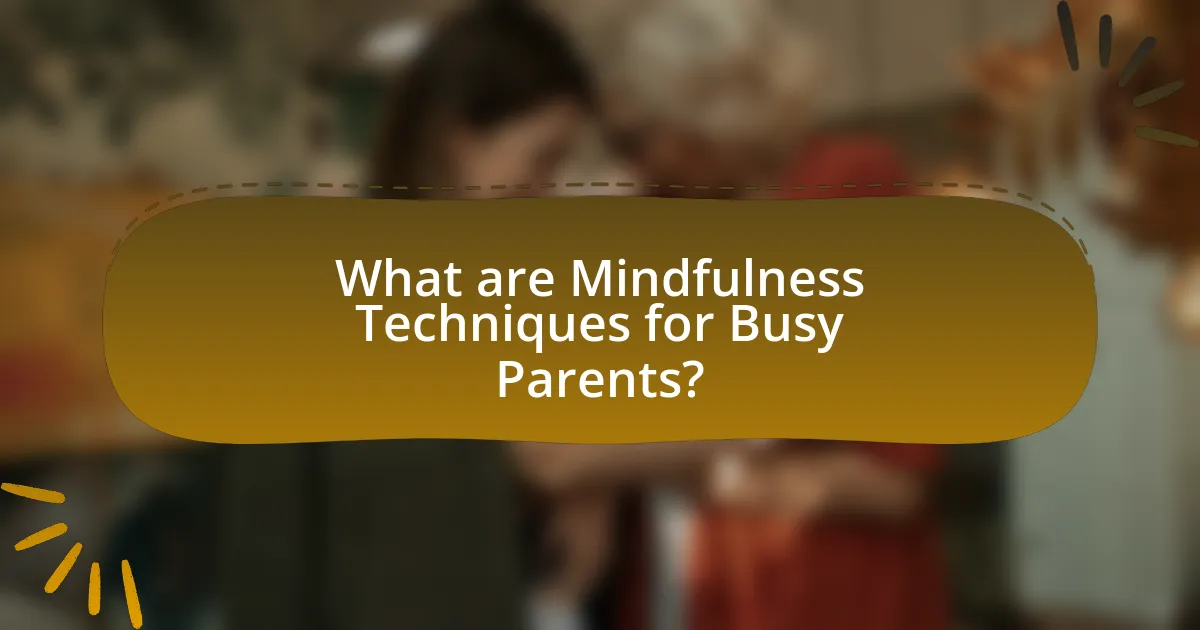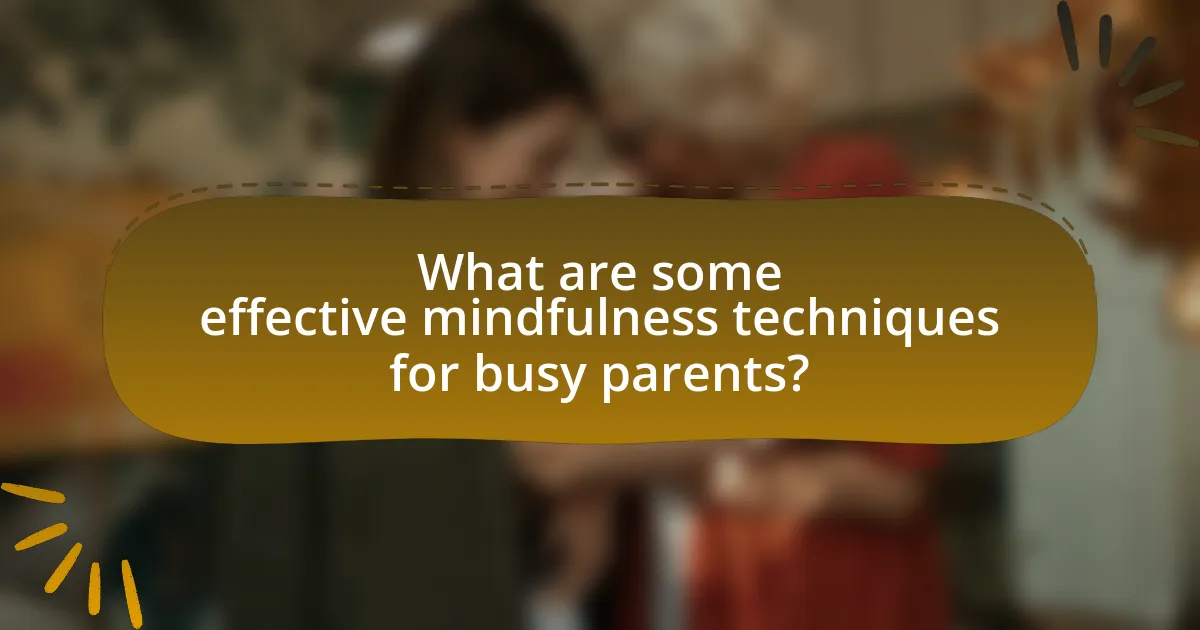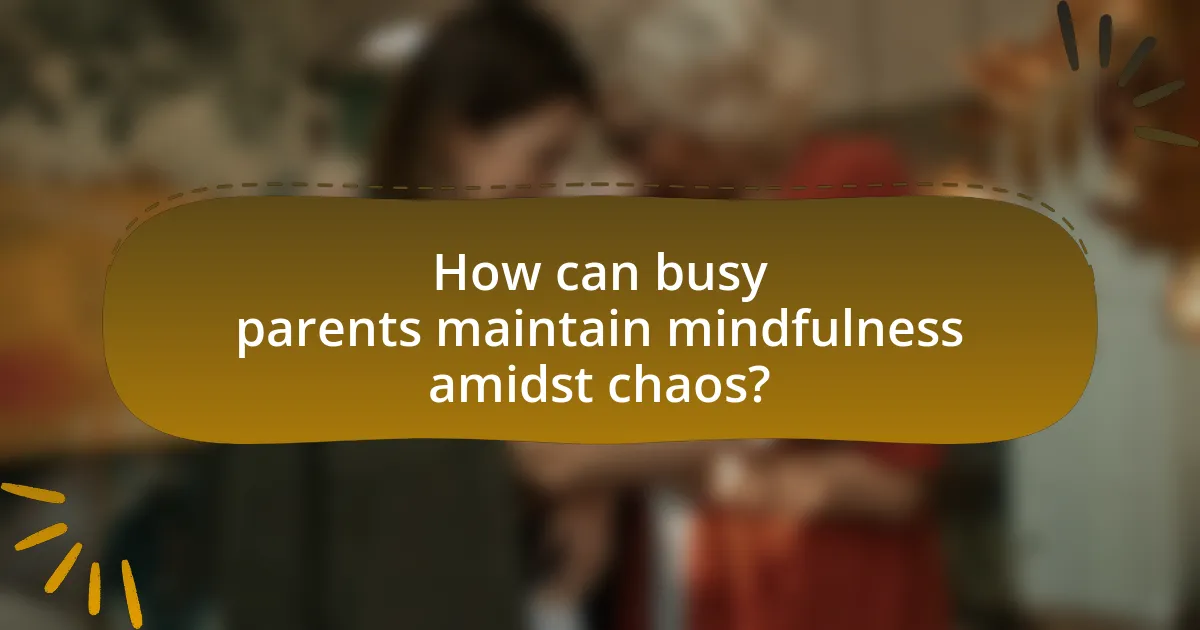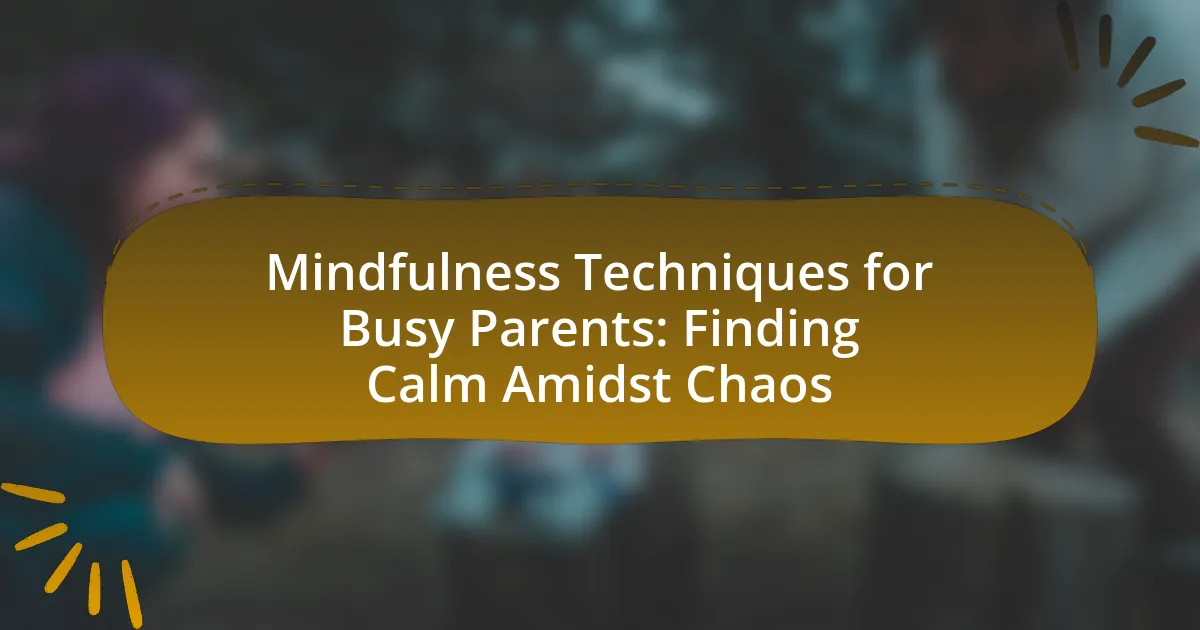The article focuses on mindfulness techniques specifically designed for busy parents, highlighting practices such as deep breathing exercises, mindful observation, and short meditation sessions. It discusses how these techniques can help manage stress by promoting present-moment awareness and emotional regulation, addressing common stressors faced by parents, including time constraints and financial pressures. Additionally, the article outlines practical strategies for incorporating mindfulness into daily routines, the psychological benefits of mindfulness for parents, and the impact of mindfulness on parenting styles and family dynamics. Overall, it emphasizes the importance of mindfulness in enhancing well-being and fostering healthier family relationships amidst the chaos of parenting.

What are Mindfulness Techniques for Busy Parents?
Mindfulness techniques for busy parents include deep breathing exercises, mindful observation, and short meditation sessions. Deep breathing exercises involve taking slow, deep breaths to reduce stress and promote relaxation, which can be done in just a few minutes. Mindful observation encourages parents to focus on their surroundings, such as noticing the colors and sounds in their environment, helping to ground them in the present moment. Short meditation sessions, even as brief as five minutes, can significantly enhance emotional regulation and reduce anxiety, as supported by research from the American Psychological Association, which highlights the benefits of mindfulness in improving mental health and well-being.
How can mindfulness help busy parents manage stress?
Mindfulness can help busy parents manage stress by promoting present-moment awareness and reducing anxiety. Engaging in mindfulness practices, such as meditation or deep breathing, allows parents to focus on their immediate experiences rather than overwhelming thoughts about responsibilities. Research indicates that mindfulness can lower cortisol levels, the hormone associated with stress, thereby enhancing emotional regulation and resilience. A study published in the journal “Psychological Science” found that mindfulness training significantly reduced stress and improved overall well-being among participants, demonstrating its effectiveness in managing stress for busy individuals, including parents.
What specific stressors do busy parents face?
Busy parents face specific stressors such as time constraints, financial pressures, and the challenge of balancing work and family responsibilities. Time constraints arise from juggling multiple schedules, including work commitments, children’s activities, and household chores, leading to feelings of being overwhelmed. Financial pressures often stem from the costs associated with raising children, including childcare, education, and healthcare, which can create anxiety about meeting financial obligations. Additionally, the challenge of balancing work and family responsibilities can lead to stress as parents strive to meet the demands of their jobs while ensuring quality time with their children. These stressors are well-documented in studies, such as the American Psychological Association’s report on stress in America, which highlights the impact of these factors on parental well-being.
How does mindfulness address these stressors?
Mindfulness addresses stressors by promoting present-moment awareness, which helps individuals recognize and manage their emotional responses to stress. This practice reduces anxiety and enhances emotional regulation, allowing busy parents to respond to chaotic situations with greater calmness. Research indicates that mindfulness can decrease cortisol levels, a hormone associated with stress, thereby improving overall well-being. A study published in the journal “Psychosomatic Medicine” found that participants who engaged in mindfulness practices reported lower stress levels and improved coping strategies, demonstrating the effectiveness of mindfulness in managing stressors.
Why is mindfulness important for parents?
Mindfulness is important for parents because it enhances emotional regulation and reduces stress, leading to healthier family dynamics. By practicing mindfulness, parents can improve their ability to respond calmly to challenging situations, fostering a more positive environment for their children. Research indicates that mindfulness practices can decrease parental anxiety and increase overall well-being, which in turn positively influences children’s emotional and behavioral outcomes. For instance, a study published in the Journal of Child and Family Studies found that parents who engaged in mindfulness reported lower levels of stress and greater satisfaction in their parenting roles.
What are the psychological benefits of mindfulness for parents?
Mindfulness offers several psychological benefits for parents, including reduced stress, improved emotional regulation, and enhanced overall well-being. Research indicates that practicing mindfulness can lead to lower levels of anxiety and depression, which are common among parents due to the demands of parenting. A study published in the journal “Mindfulness” by Khoury et al. (2015) found that mindfulness practices significantly decrease stress and improve mental health outcomes. Additionally, mindfulness helps parents develop greater patience and empathy, fostering healthier relationships with their children. This is supported by findings from a study in “Parenting: Science and Practice” by Dunning et al. (2019), which showed that mindful parenting correlates with increased emotional awareness and responsiveness.
How does mindfulness impact parenting styles?
Mindfulness positively impacts parenting styles by promoting emotional regulation and enhancing parent-child interactions. Research indicates that parents who practice mindfulness are more likely to respond to their children’s needs with patience and empathy, leading to a nurturing environment. A study published in the Journal of Child and Family Studies found that mindful parenting is associated with lower levels of parental stress and improved parent-child relationships, as it encourages parents to be present and attentive during interactions. This presence fosters secure attachment and better emotional outcomes for children, demonstrating the significant influence of mindfulness on effective parenting styles.

What are some effective mindfulness techniques for busy parents?
Effective mindfulness techniques for busy parents include deep breathing exercises, short meditation sessions, and mindful walking. Deep breathing exercises, such as inhaling for four counts, holding for four counts, and exhaling for four counts, can quickly reduce stress and promote relaxation. Short meditation sessions, even just five minutes of focused attention on the breath, can enhance emotional regulation and clarity. Mindful walking, where parents focus on the sensations of each step and their surroundings, can serve as a grounding practice that integrates movement with mindfulness. Research indicates that these techniques can significantly improve mental well-being and reduce anxiety, making them practical tools for parents managing hectic schedules.
How can busy parents incorporate mindfulness into their daily routines?
Busy parents can incorporate mindfulness into their daily routines by practicing short, focused breathing exercises during transitions, such as while waiting for their children or during commutes. Research indicates that even brief mindfulness practices can reduce stress and improve emotional regulation, making them effective for busy individuals. For instance, a study published in the journal “Psychological Science” found that just a few minutes of mindfulness meditation can enhance focus and decrease anxiety, which is particularly beneficial for parents managing multiple responsibilities. Additionally, integrating mindfulness into everyday activities, such as mindful eating or engaging fully in playtime with children, can further enhance their overall well-being and presence in the moment.
What are quick mindfulness exercises that can be done at home?
Quick mindfulness exercises that can be done at home include deep breathing, body scan meditation, and mindful observation. Deep breathing involves inhaling deeply through the nose, holding for a few seconds, and exhaling slowly through the mouth, which can reduce stress and promote relaxation. Body scan meditation requires lying down comfortably and mentally scanning the body from head to toe, noticing any tension or discomfort, which enhances body awareness and relaxation. Mindful observation entails focusing on a single object in the environment, such as a plant or a piece of art, and observing its details, which helps to anchor attention and cultivate present-moment awareness. These exercises can be completed in just a few minutes and are effective for busy parents seeking calm amidst chaos.
How can parents practice mindfulness during family activities?
Parents can practice mindfulness during family activities by fully engaging in the present moment and minimizing distractions. This can be achieved by setting aside devices, focusing on each other, and actively participating in conversations and activities. Research indicates that mindfulness can enhance family relationships and improve emotional regulation, as shown in a study published in the Journal of Family Psychology, which found that families practicing mindfulness reported higher levels of satisfaction and connection. By incorporating simple mindfulness techniques, such as deep breathing or expressing gratitude during activities, parents can foster a more harmonious and connected family environment.
What role does breathing play in mindfulness for parents?
Breathing plays a crucial role in mindfulness for parents by serving as a foundational technique to anchor their awareness and promote relaxation. When parents focus on their breath, they can reduce stress and anxiety, which are common in the chaotic environment of parenting. Research indicates that controlled breathing activates the parasympathetic nervous system, leading to a decrease in heart rate and blood pressure, thus fostering a state of calm. This physiological response supports parents in managing their emotions and enhances their ability to respond thoughtfully to their children rather than reacting impulsively.
How can parents use breathing techniques to find calm?
Parents can use breathing techniques to find calm by practicing deep, slow breaths to activate the body’s relaxation response. This method involves inhaling deeply through the nose for a count of four, holding the breath for a count of four, and exhaling slowly through the mouth for a count of six. Research indicates that controlled breathing can reduce stress and anxiety levels, as it lowers cortisol, the stress hormone, and promotes a sense of tranquility. By incorporating these techniques into their daily routine, parents can effectively manage stress and create a more peaceful environment for themselves and their families.
What are some simple breathing exercises for busy parents?
Simple breathing exercises for busy parents include diaphragmatic breathing, box breathing, and 4-7-8 breathing. Diaphragmatic breathing involves inhaling deeply through the nose, allowing the abdomen to expand, and then exhaling slowly through the mouth. This technique promotes relaxation and reduces stress. Box breathing consists of inhaling for four counts, holding the breath for four counts, exhaling for four counts, and holding again for four counts, which helps to center the mind and calm anxiety. The 4-7-8 breathing method requires inhaling for four counts, holding the breath for seven counts, and exhaling for eight counts, which can help induce a state of calm and improve focus. These exercises are effective because they activate the body’s relaxation response, reducing cortisol levels and promoting a sense of well-being.

How can busy parents maintain mindfulness amidst chaos?
Busy parents can maintain mindfulness amidst chaos by incorporating short, intentional moments of awareness into their daily routines. For instance, dedicating just five minutes for deep breathing or mindful observation during transitions, such as waiting for a child to finish a school activity, can significantly enhance their ability to stay present. Research indicates that even brief mindfulness practices can reduce stress and improve emotional regulation, as shown in a study published in the journal “Psychological Science,” which found that participants who engaged in short mindfulness exercises reported lower levels of anxiety and greater focus. By integrating these small practices into their busy schedules, parents can cultivate a sense of calm and presence, even in chaotic environments.
What strategies can help parents stay mindful during hectic times?
Parents can stay mindful during hectic times by implementing short, focused breathing exercises. Research indicates that even a few minutes of deep breathing can reduce stress and enhance emotional regulation, allowing parents to respond more calmly to chaotic situations. For instance, a study published in the Journal of Clinical Psychology found that participants who practiced mindful breathing reported lower anxiety levels and improved focus. Additionally, setting aside specific times for mindfulness practices, such as meditation or yoga, can help parents create a routine that fosters mental clarity and emotional resilience amidst daily challenges.
How can parents create a mindful environment at home?
Parents can create a mindful environment at home by establishing routines that incorporate mindfulness practices, such as meditation, deep breathing exercises, and designated quiet spaces. Research indicates that consistent mindfulness practices can reduce stress and improve emotional regulation in both parents and children, fostering a calmer home atmosphere. For example, a study published in the Journal of Child and Family Studies found that families who engaged in mindfulness activities reported lower levels of anxiety and improved family dynamics. By integrating these practices into daily life, parents can cultivate a supportive environment that encourages mindfulness and emotional well-being.
What are the benefits of setting aside time for mindfulness practice?
Setting aside time for mindfulness practice enhances mental clarity and emotional regulation. Research indicates that regular mindfulness practice can reduce stress levels by up to 30%, improve focus, and increase overall well-being. A study published in the journal “Psychological Science” by Zeidan et al. (2010) found that just 4 days of mindfulness training significantly improved participants’ attention and cognitive flexibility. Additionally, mindfulness can foster a greater sense of presence, allowing busy parents to engage more fully with their children and daily activities, thereby improving family dynamics and personal satisfaction.
How can parents overcome challenges to practicing mindfulness?
Parents can overcome challenges to practicing mindfulness by establishing a consistent routine that incorporates short, focused mindfulness exercises into their daily lives. Research indicates that even brief mindfulness practices, such as five minutes of deep breathing or guided meditation, can significantly reduce stress and improve emotional regulation. For instance, a study published in the journal “Psychological Science” found that just a few minutes of mindfulness practice can enhance attention and decrease anxiety levels. By integrating these practices into everyday activities, such as during commutes or while waiting, parents can effectively cultivate mindfulness despite their busy schedules.
What common obstacles do parents face in maintaining mindfulness?
Parents commonly face time constraints, distractions, and emotional challenges in maintaining mindfulness. The demands of daily life, such as work responsibilities and children’s activities, often leave little time for self-reflection or mindfulness practices. Additionally, external distractions, including technology and noise, can interrupt moments of mindfulness. Emotional challenges, such as stress and anxiety, further complicate the ability to stay present and focused. Research indicates that 70% of parents report feeling overwhelmed, which significantly impacts their capacity to engage in mindfulness effectively.
How can parents develop a consistent mindfulness practice despite a busy schedule?
Parents can develop a consistent mindfulness practice despite a busy schedule by integrating short mindfulness exercises into their daily routines. For instance, dedicating just five minutes to deep breathing or mindful observation during transitions, such as waiting for a child or during meal prep, can effectively cultivate mindfulness. Research indicates that even brief mindfulness practices can reduce stress and enhance emotional regulation, making them beneficial for busy parents. A study published in the journal “Mindfulness” found that participants who engaged in short, regular mindfulness exercises reported significant improvements in their overall well-being and stress levels. By utilizing these small pockets of time, parents can create a sustainable mindfulness practice that fits seamlessly into their hectic lives.
What are some practical tips for busy parents to enhance mindfulness?
Busy parents can enhance mindfulness by incorporating short, intentional practices into their daily routines. One effective method is to engage in mindful breathing for just a few minutes each day, which can reduce stress and improve focus. Research indicates that even brief mindfulness exercises can lead to significant improvements in emotional regulation and overall well-being. Additionally, parents can practice mindfulness during everyday activities, such as eating or walking, by fully concentrating on the experience and sensations involved. This approach not only fosters a greater sense of presence but also helps in managing the chaos of daily life.
